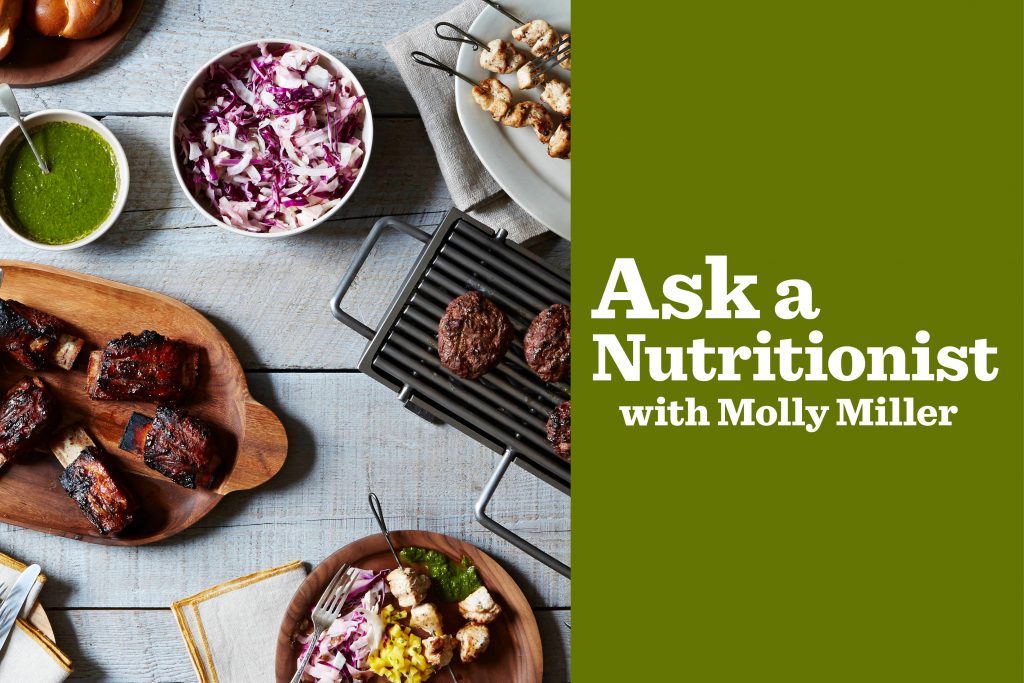Summer is in full swing, and that means many of us are pulling out our grills for weekend cookouts. But while some reach for classic favorites like burgers, brats, and chicken, what about alternative protein options? Can we get the protein we need through traditional and plant-based diets? And can plant-based protein give us the same right-off-the-grill flavor?
As the world’s leading protein provider, we are committed to good, nourishing food for all needs and preferences. We sat down again with Molly Miller, lead registered dietitian nutritionist (RDN) for Research and Development, to learn more about alternative protein and making the most of grilling season.
Can I meet all my protein needs with alternative proteins?
Miller: When it comes to protein, people typically think of meat, chicken, eggs and milk first, but a plant-based diet that contains whole grains, soy, beans, peas, nuts and seeds can provide your needed amounts of protein. The Dietary Guidelines for Americans shows we can meet our protein needs with a variety of healthy eating patterns, including a healthy vegetarian diet.
The most important thing to remember is to personalize your diet to reflect your preferences and cultural traditions. This could be eating primarily plant-based proteins or eating a variety of foods with protein from both plant and animal.
I’ve heard about “complete” and “incomplete” proteins, but these terms can be confusing. What’s the difference between “complete” vs. “incomplete” proteins, and what are some ways to supplement the incomplete proteins often found in, say, a plant-based diet?
Miller: Complete proteins contain all the essential amino acids in adequate amounts to support growth. Animal proteins (such as dairy products, eggs, meats, poultry, and seafood) and soy are complete proteins.
Incomplete proteins are missing or do not have enough of one or more of the essential amino acids, making the protein imbalanced or incomplete. Most plant foods such as beans, peas, grains, nuts, seeds, and vegetables are incomplete proteins.
Alternative proteins may contain the same amount of protein as traditional protein, but the quality of protein may be different due to the amino acid content as proteins are made up of different amino acid combinations.
We can get enough amino acids through various traditional proteins or eat two or more incomplete proteins at the same meal or in the same day. The different incomplete proteins balance each other’s lack of amino acids. For example, grains are low in one amino acid (lysine), while beans and nuts are low in another (methionine). When we eat them together, such as rice and beans, they form a complete protein.
How can alternative proteins add versatility to our diets without compromising nutritional value, taste, and quality?
Miller: There have always been alternative proteins such as soy, beans, peanut butter, nuts, and seeds that consumers may not have recognized as protein sources.
Now there is growing consumer interest in alternative proteins that mirror the experience of eating meat. With new products in the marketplace, it is easier than ever to find a product that may mimic meat and fit your lifestyle – and we offer some great-tasting options at Tyson Foods.
Our Raised & Rooted brand of plant-based protein includes regular and spicy plant-based nuggets and whole grain tenders. We also have plant-based burgers, sausages, and bites.
Jimmy Dean Brand has a new Jimmy Dean Delights plant-based patty and frittata breakfast sandwich with a plant-based patty, topped with a spinach and egg white frittata. The brand also has a breakfast sandwich with a plant-based patty, egg, and cheese on a croissant.
What are the benefits of incorporating alternative proteins into our diets?
Miller: The Dietary Guidelines for Americans recommend we try and limit our saturated fat consumption. Many alterative proteins contain less saturated fat and no cholesterol, offering a good source of protein along with other essential nutrients like fiber, calcium, iron, and potassium.
What are your favorite alternative proteins?
Miller: I love the taste of the Raised & Rooted burger on the grill and the benefit of it having less saturated fat! The ground plant-based protein makes a great substitution and is perfect for tacos – a favorite dish of mine because of the variety it offers. My kids also love the spicy plant-based nuggets from Raised & Rooted!
Speaking of grilling, July is Grilling Month, and we all have weekend cookouts on the mind. When selecting a protein for the grill, what should I look out for in different cuts of meat in terms of nutrition and benefits?
Miller: When I think of nutritious summer meals, I think of grilling! Gilling can be a great way to cook your proteins. To keep it more nutritious, you can pick leaner cuts of meat like chicken breasts, pork tenderloin, flank steak, or the always popular burger made with 90/10 ground beef. These leaner cuts of meat have less saturated fat and work well with marinades for infusing flavor.
But don’t forget your fruits and vegetables. In fact, many fruits and vegetables take on a whole new flavor after a few minutes on the grill. You can add color to your plate by tossing pineapple, peaches, zucchini, squash, or peppers on the grill.
The most important thing to remember is to avoid cross contamination and cook meat to a safe temperature, so have a meat thermometer handy. This chart from FoodSafety.gov provides minimum temperatures for traditional proteins.
What should I know about grilling alternative proteins?
Miller: Our new Raised & Rooted burgers and sausages have grilling instructions on the back of the package, and the process is similar to grilling traditional protein products like hamburgers and brats.
For the burgers and sausages, preheat the greased grill to medium and grill for 10-12 minutes, or until thoroughly cooked, turning the burgers and sausages occasionally. Simple as that!
I’m a big fan of all-in-one meals, like one-pan dinners in the oven. What are your favorite all-in-one meals for the grill?
Miller: I’m a big fan of these, too, and foil packs are great on the grill. You simply take foil, add your protein and desired sides, and wrap it all up together for the grill. I love marinated chicken with a potato and a side of seasoned, seasonal veggies wrapped in foil. Sausage with peppers and pineapple is all popular at my house.
Kebabs are another favorite. You can choose your favorite protein, potato, veggies, and fruit for an easy weeknight meal or weekend cookout.
As demand for all kinds of protein – including alternative and plant-based protein – grows globally, Tyson Foods continues to provide protein that meets consumer needs and preferences. Earlier this year, we announced the growth and expansion of our protein portfolio offerings to meet the evolving needs of families around the world.





